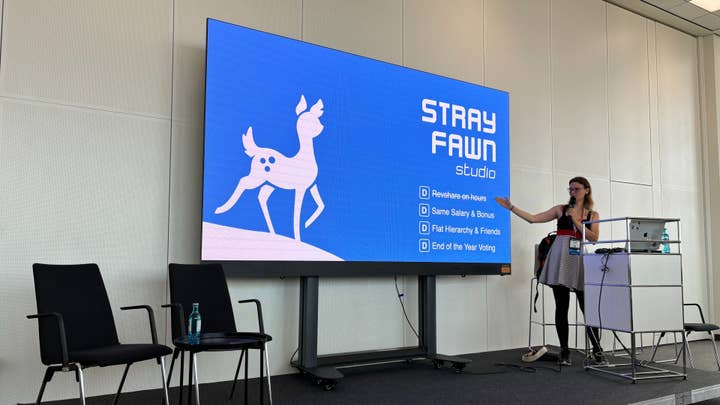How Stray Fawn survived eight years as an indie with no investors or publisher
Co-founder Philomena Schwab shares how community support and crowdfunding helped build the studio
Speaking at Devcom, Stray Fawn co-founder Philomena Schwab shared how the Zurich-based studio has survived for the past eight years, from refusing to partner with a publisher to the importance of community support when developing a game.
Schwab emphasised that Stray Fawn prides itself on being an independent studio, with no publisher or external investors.
Even when its first game, genetics survival title Niche, started getting publisher interest after crowdfunding success, the studio continued to decline offers. This was due to previous experience from making a mobile game which had a publisher that didn't go so well.
"So I thought the next time a game flops, I want to be fully responsible for that game flopping," she explained. "It's not up to somebody else to flop my game. This will be on me, so we declined the offers that we had."
Stray Fawn still declined publisher offers even with the recent success of The Wandering Village (despite being "harder to say no").
"I think we had 50 or so publishers reaching out," Schwab recalled. "Some we were very tempted to work with as it was such a risky project. But we decided we didn't want to do that – not just because we wanted to keep all the revenue, but also because we didn't want to have any external deadlines, and we didn't want to compromise on the game's quality."
This aligned with Stray Fawn's ethos, in that the team wanted it to be owned by the developers without a third-party.
"It was never our intention to build a studio and sell it in the next five to ten years," she said. "What we wanted to do is build a place where we can enjoy creating games together and make a living."
And since founding the studio, the way in which developers make a living is by earning the same salary.
Also, if someone works for the developer for three years, they get the same bonus as the founders. The only other factor is if an employee is working part-time or full-time.
"The next time a game flops, I want to be fully responsible for that game flopping"
"Everybody makes the same amount, everyone knows what each other is earning," Schwab added. "I think this gives everybody a lot of motivation because they directly benefit from all the work they have done."
Outside of the inner workings of the studio, Schwab emphasised the significance of community support. The launch of the studio's first game with early access was small, but this skyrocketed at full launch due to its growing community sharing the game on social media and getting the attention of streamers.
"It was a very lucky first case scenario," Schwab noted. "It's not very often that you make a first game and it's actually successful. But community building was a very big part of the first success."
Creating this baseline in community support helped in having a growing number of players invested in whatever games the studio released, regardless of the genre.
While the five games in the studio's portfolio are vastly different from one another, the same can't be said for its publishing side.
"I think we did something smart, because we're signing games that are similar to our last game," she said, referring to The Wandering Village.
This has since enabled Stray Fawn to cross promote the city-builders with their latest game, and vice versa.
"My team doesn't want [the next game to be the same genre as the last]. So the publishing side is going to publish similar games as the ones that we recently made."
As for why they decided to become a publisher themselves despite not wanting to work with one, it was a simple decision according to Schwab.
"We are trying to be the publishers that we would have liked to sign with," she explained. "For us, it's still a side thing. We're not really dependent on the revenue from publishing. So if it doesn't work out with a game, we don't want to push too much.
"We try to contribute, but we don't want to push developers in a [certain] direction if we feel they have a completely different vision than us.
"[It's all about] a lack of time pressure and not wanting to put creative boundaries in place."
GamesIndustry.biz is a media partner for Devcom. The organisers provided travel and accommodation

